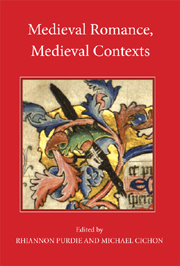Book contents
- Frontmatter
- Contents
- Acknowledgements
- Contributors
- Abbreviations
- Introduction: Romance and its Medieval Contexts
- 1 The Pleasure of Popular Romance: A Prefatory Essay
- 2 Representations of Peasant Speech: Some Literary and Social Contexts for The Taill of Rauf Coilyear
- 3 ‘As ye have brewd, so shal ye drink’: the Proverbial Context of Eger and Grime
- 4 Ekphrasis and Narrative in Emaré and Sir Eglamour of Artois
- 5 What's in a Name? Anglo-Norman Romances or Chansons de geste?
- 6 ‘For Goddes loue, sir, mercy!’: Recontextualising the Modern Critical Text of Floris and Blancheflor
- 7 Roland in England: Contextualising the Middle English Song of Roland
- 8 Romance Baptisms and Theological Contexts in The King of Tars and Sir Ferumbras
- 9 Modern and Medieval Views on Swooning: the Literary and Medical Contexts of Fainting in Romance
- 10 Walking (between) the Lines: Romance as Itinerary/Map
- 11 Romances of Continuity in the English Rous Roll
- 12 ‘Ex Libris domini duncani / Campbell de glenwrquhay/ miles’: The Buik of King Alexander the Conquerour in the household of Sir Duncan Campbell, seventh laird of Glenorchy
- 13 ‘Pur les francs homes amender’: Clerical Authors and the Thirteenth-Century Context of Historical Romance
- Index
- Volumes already published
13 - ‘Pur les francs homes amender’: Clerical Authors and the Thirteenth-Century Context of Historical Romance
Published online by Cambridge University Press: 12 September 2012
- Frontmatter
- Contents
- Acknowledgements
- Contributors
- Abbreviations
- Introduction: Romance and its Medieval Contexts
- 1 The Pleasure of Popular Romance: A Prefatory Essay
- 2 Representations of Peasant Speech: Some Literary and Social Contexts for The Taill of Rauf Coilyear
- 3 ‘As ye have brewd, so shal ye drink’: the Proverbial Context of Eger and Grime
- 4 Ekphrasis and Narrative in Emaré and Sir Eglamour of Artois
- 5 What's in a Name? Anglo-Norman Romances or Chansons de geste?
- 6 ‘For Goddes loue, sir, mercy!’: Recontextualising the Modern Critical Text of Floris and Blancheflor
- 7 Roland in England: Contextualising the Middle English Song of Roland
- 8 Romance Baptisms and Theological Contexts in The King of Tars and Sir Ferumbras
- 9 Modern and Medieval Views on Swooning: the Literary and Medical Contexts of Fainting in Romance
- 10 Walking (between) the Lines: Romance as Itinerary/Map
- 11 Romances of Continuity in the English Rous Roll
- 12 ‘Ex Libris domini duncani / Campbell de glenwrquhay/ miles’: The Buik of King Alexander the Conquerour in the household of Sir Duncan Campbell, seventh laird of Glenorchy
- 13 ‘Pur les francs homes amender’: Clerical Authors and the Thirteenth-Century Context of Historical Romance
- Index
- Volumes already published
Summary
The Anglo-Norman romances offer a welcome exception to the widespread anonymity of insular romance. Since Legge's seminal work, these romances have been confidently associated with the milieu of the Anglo-Norman baronial class, and with places and events close to their world. Legge sees them as ‘ancestral’, others, such as Crane, as more generally representing the tastes and interests of the baronial class. Something is known, and more persuasively speculated, about their patrons, and many of their authors are named. The argument as to whether or not these romances can be read as ‘ancestral’ has long focused interest on patronage, as have other approaches: the theoretical death of the author, the near-invisibility of many of these authors (although not by comparison with the Middle English versions), the interest in reception, in audience, in women in that audience, even in ownership of manuscripts – all these interests focus on the issue of whom these works were written for and prioritise the agency of the patron and audience over that of the author. The patrons are more glamorous, redolent of the colour and power of medieval lordship, and so there is a tendency to see them as setting the agenda. I should like to shift the enquiry onto whom the romances were written by and to re-examine the models we have of the relationship between author and patron, in order to ask whose interest is being served.
- Type
- Chapter
- Information
- Medieval Romance, Medieval Contexts , pp. 175 - 188Publisher: Boydell & BrewerPrint publication year: 2011



